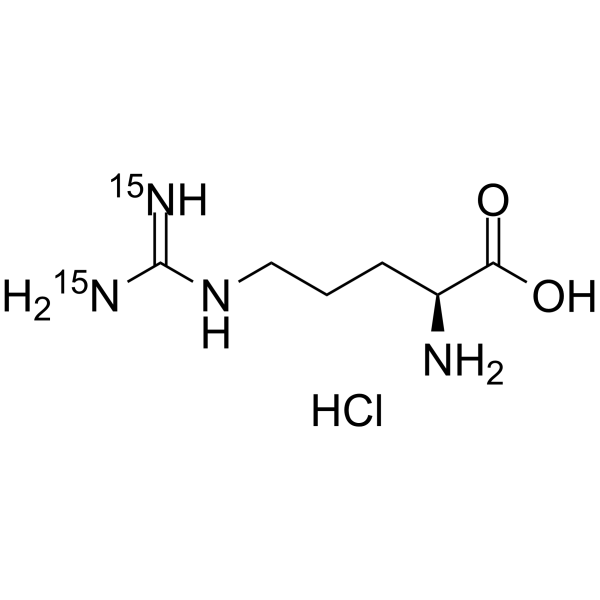[1]. Russak EM, et al. Impact of Deuterium Substitution on the Pharmacokinetics of Pharmaceuticals. Ann Pharmacother. 2019;53(2):211-216.
[2]. Tapiero H, et al. I. Arginine. Biomed Pharmacother. 2002 Nov;56(9):439-45.
[3]. Tapiero H, et al. I. Arginine. Biomed Pharmacother. 2002 Nov;56(9):439-45.
[4]. Tapiero H, et al. I. Arginine. Biomed Pharmacother. 2002 Nov;56(9):439-45.
[5]. Tapiero H, et al. I. Arginine. Biomed Pharmacother. 2002 Nov;56(9):439-45.
[6]. Tapiero H, et al. I. Arginine. Biomed Pharmacother. 2002 Nov;56(9):439-45.
[7]. Tapiero H, et al. I. Arginine. Biomed Pharmacother. 2002 Nov;56(9):439-45.
[8]. Tapiero H, et al. I. Arginine. Biomed Pharmacother. 2002 Nov;56(9):439-45.
[9]. Tapiero H, et al. I. Arginine. Biomed Pharmacother. 2002 Nov;56(9):439-45.
[10]. Bakker J, et al. Administration of the nitric oxide synthase inhibitor NG-methyl-L-arginine hydrochloride (546C88) by intravenous infusion for up to 72 hours can promote the resolution of shock in patients with severe sepsis: results of a randomized, double-blind, placebo-controlled multicenter study (study no. 144-002). Crit Care Med. 2004 Jan;32(1):1-12.
[11]. Tapiero H, et al. I. Arginine. Biomed Pharmacother. 2002 Nov;56(9):439-45.
[12]. Bakker J, et al. Administration of the nitric oxide synthase inhibitor NG-methyl-L-arginine hydrochloride (546C88) by intravenous infusion for up to 72 hours can promote the resolution of shock in patients with severe sepsis: results of a randomized, double-blind, placebo-controlled multicenter study (study no. 144-002). Crit Care Med. 2004 Jan;32(1):1-12.
[13]. Bakker J, et al. Administration of the nitric oxide synthase inhibitor NG-methyl-L-arginine hydrochloride (546C88) by intravenous infusion for up to 72 hours can promote the resolution of shock in patients with severe sepsis: results of a randomized, double-blind, placebo-controlled multicenter study (study no. 144-002). Crit Care Med. 2004 Jan;32(1):1-12.
[14]. Bakker J, et al. Administration of the nitric oxide synthase inhibitor NG-methyl-L-arginine hydrochloride (546C88) by intravenous infusion for up to 72 hours can promote the resolution of shock in patients with severe sepsis: results of a randomized, double-blind, placebo-controlled multicenter study (study no. 144-002). Crit Care Med. 2004 Jan;32(1):1-12.
[15]. Bakker J, et al. Administration of the nitric oxide synthase inhibitor NG-methyl-L-arginine hydrochloride (546C88) by intravenous infusion for up to 72 hours can promote the resolution of shock in patients with severe sepsis: results of a randomized, double-blind, placebo-controlled multicenter study (study no. 144-002). Crit Care Med. 2004 Jan;32(1):1-12.
[16]. Bakker J, et al. Administration of the nitric oxide synthase inhibitor NG-methyl-L-arginine hydrochloride (546C88) by intravenous infusion for up to 72 hours can promote the resolution of shock in patients with severe sepsis: results of a randomized, double-blind, placebo-controlled multicenter study (study no. 144-002). Crit Care Med. 2004 Jan;32(1):1-12.
[17]. Bakker J, et al. Administration of the nitric oxide synthase inhibitor NG-methyl-L-arginine hydrochloride (546C88) by intravenous infusion for up to 72 hours can promote the resolution of shock in patients with severe sepsis: results of a randomized, double-blind, placebo-controlled multicenter study (study no. 144-002). Crit Care Med. 2004 Jan;32(1):1-12.
[18]. Bakker J, et al. Administration of the nitric oxide synthase inhibitor NG-methyl-L-arginine hydrochloride (546C88) by intravenous infusion for up to 72 hours can promote the resolution of shock in patients with severe sepsis: results of a randomized, double-blind, placebo-controlled multicenter study (study no. 144-002). Crit Care Med. 2004 Jan;32(1):1-12.
[19]. Yamada M, et al. Endothelial nitric oxide synthase-dependent cerebral blood flow augmentation by L-arginine after chronic statin treatment. J Cereb Blood Flow Metab. 2000 Apr;20(4):709-17.
[20]. Bakker J, et al. Administration of the nitric oxide synthase inhibitor NG-methyl-L-arginine hydrochloride (546C88) by intravenous infusion for up to 72 hours can promote the resolution of shock in patients with severe sepsis: results of a randomized, double-blind, placebo-controlled multicenter study (study no. 144-002). Crit Care Med. 2004 Jan;32(1):1-12.
[21]. Yamada M, et al. Endothelial nitric oxide synthase-dependent cerebral blood flow augmentation by L-arginine after chronic statin treatment. J Cereb Blood Flow Metab. 2000 Apr;20(4):709-17.
[22]. Yamada M, et al. Endothelial nitric oxide synthase-dependent cerebral blood flow augmentation by L-arginine after chronic statin treatment. J Cereb Blood Flow Metab. 2000 Apr;20(4):709-17.
[23]. Yamada M, et al. Endothelial nitric oxide synthase-dependent cerebral blood flow augmentation by L-arginine after chronic statin treatment. J Cereb Blood Flow Metab. 2000 Apr;20(4):709-17.
[24]. Yamada M, et al. Endothelial nitric oxide synthase-dependent cerebral blood flow augmentation by L-arginine after chronic statin treatment. J Cereb Blood Flow Metab. 2000 Apr;20(4):709-17.
[25]. Yamada M, et al. Endothelial nitric oxide synthase-dependent cerebral blood flow augmentation by L-arginine after chronic statin treatment. J Cereb Blood Flow Metab. 2000 Apr;20(4):709-17.
[26]. Yamada M, et al. Endothelial nitric oxide synthase-dependent cerebral blood flow augmentation by L-arginine after chronic statin treatment. J Cereb Blood Flow Metab. 2000 Apr;20(4):709-17.
[27]. Yamada M, et al. Endothelial nitric oxide synthase-dependent cerebral blood flow augmentation by L-arginine after chronic statin treatment. J Cereb Blood Flow Metab. 2000 Apr;20(4):709-17.
[28]. Yamada M, et al. Endothelial nitric oxide synthase-dependent cerebral blood flow augmentation by L-arginine after chronic statin treatment. J Cereb Blood Flow Metab. 2000 Apr;20(4):709-17.

